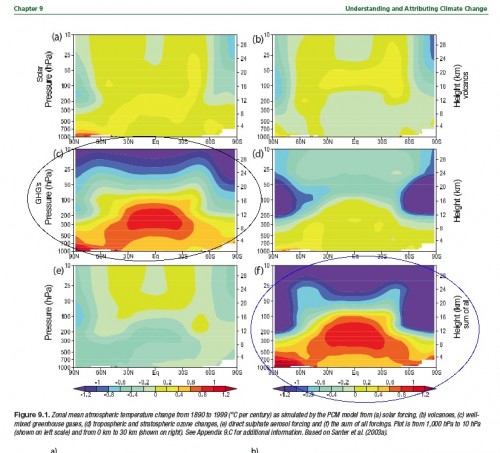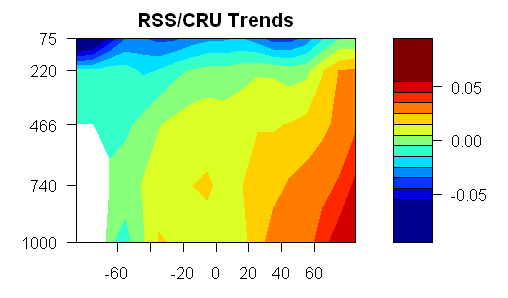Over at the Blackboard, Lucia has a post with a growing set of comments about anthropogenic warming and the tropical, mid-tropospheric hotspot. Unlike many who are commenting on the topic, I have actually read most of the IPCC AR4 (painful as that was), and came to the same conclusion as Lucia: that the IPCC said the climate models predicted a hot spot in the mid-troposphere, and that this hot spot was a unique fingerprint of global warming (“fingerprint” being a particularly popular word among climate scientists). Quoting Lucia:
I have circled the plates illustrating the results for well mixed GHG’s and those for all sources of warming combined. As you see, according to the AR4– a consensus document written for the UN’s IPCC and published in 2007 — models predict the effect of GHG’s as distinctly different from that of solar or volcanic forcings. In particular: The tropical tropospheric hotspots appears in the plate discussing heating by GHG’s and does not appear when the warming results from other causes.

OK, pretty straight-forward. The problem is that this hot spot has not really appeared. In fact, the pattern of warming by altitude and latitude over the last thirty years looks nothing like the circled prediction graphs. Steve McIntyre does some processing of RSS satellite data and produces this chart of actual temperature anomalies for the last 30 years by attitude and altitude (Altitude is measured in these graphs by atmospheric pressure, where 1000 millibars is the surface and 100 millibars is about 10 miles up.

The scientists at RealClimate (lead defenders of the climate orthodoxy) are not unaware that the hot spot is not appearing. They responded about a year ago that 1) The hot spot is not an anthropogentic-specific fingerprint at all, but will result from all new forcings
the pattern really has nothing to do with greenhouse gas changes, but is a more fundamental response to warming (however caused). Indeed, there is a clear physical reason why this is the case – the increase in water vapour as surface air temperature rises causes a change in the moist-adiabatic lapse rate (the decrease of temperature with height) such that the surface to mid-tropospheric gradient decreases with increasing temperature (i.e. it warms faster aloft). This is something seen in many observations and over many timescales, and is not something unique to climate models.
and they argued 2) that we have not had enough time for the hot spot to appear and they argued 3) all that satellite data really has a lot of error in it anyway.
Are the Real Climate guys right on this? I don’t know. That’s what they suck up all my tax money for, to figure this stuff out.
But here is what makes me crazy: It is quite normal in science for scientists to have a theory, make a prediction based on this theory, and then go back and tweak the theory when data from real physical processes does not match the predictions. There is certainly no shame in being wrong. The whole history of science is about lurching from failed hypothesis to the next, hopefully improving understanding with each iteration.
But the weird thing about climate science is the sort of Soviet-era need to rewrite history. Commenters on both Lucia’s site and at Climate Audit argue that the IPCC never said the hot spot was a unique fingerprint. The fingerprint has become an un-person.
Why would folks want to do this? After all, science is all about hypothesis – experimentation – new hypothesis. Well, most science. The problem is that climate science has been declared to be 1) A Consensus and 2) Settled. But settled consensus can’t, by definition, have disagreements and falsified forecasts. So history has to be rewritten to protect the infallibility of the Pope the Presidium the climate consensus. It’s a weird way to conduct science, but a logical outcome when phrases like “the science is settled” and “consensus” are used as clubs to silence criticism.


